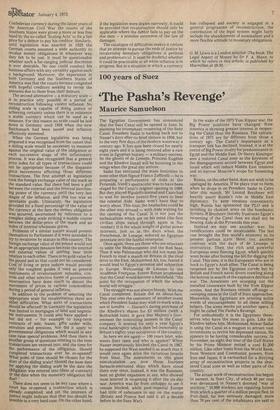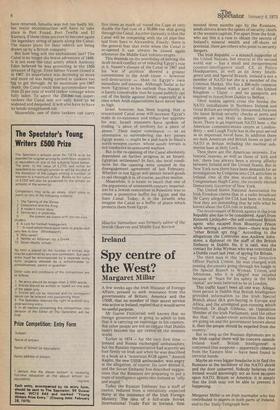100 years of Suez
'The Pasha's Revenge'
Maurice Samuelson
The Egyptian Government has announced that the Suez Canal will be opened in June. In planning his triumphant reopening of the Suez Canal, President Sadat is harking back not to Nasser's days after its brief closure in 1956, but to the very first days of the modern waterway a century ago. It has. now been closed for nearly eight years and it is being restored after a rare event in Egyptian history — a military success. So the ghosts of de Lessens, Princess Eugnie and the Khedive Ismail will be hovering in the wings when the great day arrives.
Sadat has entrusted the main festivities to none other than Signor Franco Zeffirelli — he is preparing a performance of Aida at the Pyramids. Verdi's spectacular was to have been staged for the Canal's original opening in 1869. But they played Rigoletto instead and Cairo had to wait for another twenty-five years to hear the celestial Aida. Sadat won't have that to worry about. This time, the headaches could be the other way around — with Aida waiting for the opening of the Canal. It is not just the technicalities which are on his mind (the first civilian ships sailed through again in November). It is the whole weight of global power interests, just as in the days when the Frenchman, de Lesseps, seduced an Egyptian potentate into the fateful enterprise. Once again, there are those who are reluctant to unite the Mediterranean and the Red Seas. Then it was Palmerston who did not want the French to steal a march on Britain in the rival drive to the East. Mohammed Ali, too, feared it would lead to Egypt's invasion and subjection to Europe. Welcoming de Lessens to the Acaddmie Francaise, Ernest Renan prophesied that the Canal would become a battlefield, "the point for the occupation of which the whole world will struggle."
The struggle was not always bloody. With the Canal completed, Britain did an about-face. This year sees the centenary of another event which President Sadat may wish to mark with a son et lumiere — Disraeli's daring purchase of the Khedive's shares for £3 million (with Rothschild loan). It gave Her Majesty's Government the controlling interest in the Canal company: It averted for only a year Egypt's total bankruptcy which then led inexorably to Britain's eighty-year occupation of the country.
So here we are again — 100 years later, who wants Suez open and who is against? When Nasser impetuously blocked the Canal in 1967, he supposed the West needed it so much that it would once again drive the victorious Israelis from Sinai. The monuments to this giant miscalculation are now those fourteen barnacle-encrusted ships which have stood there ever since. Instead, it was the Russians, bent on global expansion at sea, who showed most interest in reopening it after the six-day war. America was far from unhappy to see it remain blocked, while post-imperial Europe had little of substance to say on the matter (Britain and France had said it all a decade before in the Suez War). In the wake of the 1973 Yom Kippur war, the Big Power positions have changed. Now America is showing greater interest in reopen ing the Canal than the Russians. The calculations of 1975 are far different from those a century ago. The Canal's importance as a transport link has declined. Instead, it is at the centre of Big Power rivalry for predominance in Egypt and the Middle East. Dr Henry Kissinger sees a restored Canal zone as the keystone of the disengagement accord between Egypt and Israel which will reduce Middle East tensions and so narrow Moscow's scope for fomenting war.
Russia, on the other hand, does not wish to be upstaged by America. If he plays true to form, when he drops in on President Sadat in Cairo later this month, Mr Leonid Brezhnev will heavily assert Russia's role in Middle East diplomacy. To keep tensions conveniently high, Russia has sponsored the PLO and is lavishing its choicest arms on the bombastic Syrians. If Brezhnev thereby frustrates Egypt's reopening of the Canal then we shall not be hearing Aida al the Pyramids this year.
Instead we may see another war. Its ramifications could be incalculable. The last one brought the free world's economy to its present parlous state. Here, too, another contrast with the days of de Lessens is instructive. Then the rich and powerful Europeans were fleecing Egypt, which quickly 'went broke after footing the bill for digging the Canal. This time, it is the Europeans who are in hock to Egypt's Arab allies. The Canal is being reopened not by the Egyptian corvde but by British and French naval divers crawling along the bottom in search of the explosive detritus of war. The Americans are scooping out the metalled causeways built by, the Yom Kippur armies. And the Russians remain off-stage — sweeping mines in the Gulf of Suez approaches. Meanwhile, the Egyptians are uttering polite words of encouragement to all these willing helpers. The scene merits yet another Opera. It might be called The Pasha's Revenge.
For undoubtedly it is the Egyptians themselves who have the most to gain. Like the Khedive before him, Mohammed Anwar Sadat is using the Canal as a magnet to attract vast investments to revive his depressed nation. He appears to be having considerable success. In November, an eight-day tour of the Gulf States by his Prime Minister netted a cool $1,200 million. Like other loans from the World Bank, from Westerri and Communist powers, from Iran and Japan, it is earmarked for a dizzying array of reconstruction projects in the shattered Canal zone as well as other parts of the country. The actual work of reconstruction has begun in earnest. In Suez City, of which 80 per cent was devastated in Nasser's doomed "war of attrition," 18,000 workers are repairing homes from which a quarter of a million people fled. In
Port .Said, far. less seriously damaged, more than 70 per cent of the inhabitants are said to
have returned. Ismailia was not too badly hit, but major reconstruction will have to take place in Port Fouad, Port Tewfik and El Kantara, if these cities are ever to become again the legendary string of pearls along the Canal. The master plans for their rebirth are being drawn up by a British company.
But how long will the enthusiasm last? The Canal is no longer the brave adventure of 1869. It is not even the vital artery which Anthony Eden believed he was protecting in the 1956 invasion of Egypt. Even before Nasser closed it in 1967, its importance was declining as more and more oil was being carried in tankers too big to get through. At its maximum pre-1967 depth, the Canal could now accommodate less than 22 per cent of world tanker tonnage when fully laden. To admit the 250,000-ton supertankers the Canal will not only have to be widened and deepened. It will also have to have its bends straightened out.
Meanwhile, one of these tankers can carry five times as much oil round the Cape at only double the fuel cost of a 50,000-ton ship going through the Canal. Another curiosity is that the Canal will be competing with the oil pipe-line laid from Suez to Alexandria. Finally, there is the general fear that even when the Canal is re-opened it can always be closed again whenever the Middle East volcano erupts.
This depends on the possibility of solving the Arab-Israeli conflict or of reducing Egypt's role in it. Nasser's closure of the Canal in 1967 and his 'war of attrition' showed a greater commitment to the Arab cause — however self-destructive — than to Egypt's own immediate self-interest. Although Sadat is far more 'Egyptian' in his outlook than Nasser, it is barely conceivable that he could publicly opt Out of the battle against Israel, especially at a time when Arab expectations have never been so high.
Israel, however, has been hoping that a resuscitated Canal zone will increase Egypt's stake in co-existence and reduce her appetite for war. Israeli ministers have spoken of trading "a piece of territory for a piece of peace." Their major concession — as an alternative to surrendering the key passes Egypt wants — might be a pull-back in Sinai's north-western corner, whose sandy terrain is not conducive to armoured warfare.
But is the re-opening of the Canal absolutely dependent on further progress in an IsraeliEgyptian settlement? In fact, the local conditions for the opening were created in the disengagement agreement of last February. Whether or not Egypt will permit Israeli goods to sail through it is, of course, another matter.
Meanwhile, it is ironic to recall that oneof the arguments of nineteenth-century imperialists for a Jewish restoration in Palestine was to create a protective buffer for Egypt and the Suez .Canal. Today, it is the Israelis who imagine the Canal as a buffer of peace which protects them from Egypt.
Maurice Samuelson was formerly editor of the Jewish Observer and Middle East Review



























 Previous page
Previous page